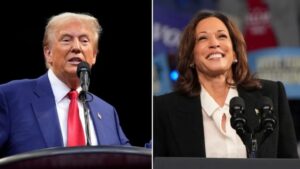As the countdown to the 2024 U.S. elections intensifies, recent polls suggest that Americans might be in for a major surprise on November 5. In a significant shift, former President Donald Trump is gaining ground in crucial battleground states, leaving current Vice President Kamala Harris struggling to maintain her momentum.
For the first time in two months, Trump is reportedly taking the lead over Harris, according to polling data from The Economist. Although the race remains extremely close, recent trends indicate a slight tilt in favor of the Republican candidate.
As of now, Trump has a 54% chance of reclaiming the presidency, marking a notable increase of six percentage points within just one week. This change comes as Harris, who is vying for the Democratic nomination, appears to be losing her previously robust support.
Despite these findings, The New York Times reports that Harris and Trump are virtually neck-and-neck, with neither candidate leading by more than a fraction of a percentage point. In several critical swing states—areas that could determine the outcome of the election—polling indicates that neither candidate holds a significant advantage, often leading by mere tenths of a percentage point.
Comparing this year’s data to the 2020 elections, The Wall Street Journal notes that Trump was trailing by between 7.2 and 8.4 percentage points against Joe Biden. Ultimately, Biden won by a margin of less than 4.5 percentage points. If polling margins of error remain consistent, the current tight race could signal an advantage for Trump.
In August, national polls showed many undecided voters leaning toward Harris. However, recent shifts indicate that a notable portion of this demographic—possibly disaffected Republicans—may now be rallying behind Trump.
Despite Trump’s rising popularity, a recent Reuters/Ipsos poll shows Harris with a slight lead, reporting 46% support for her compared to 43% for Trump. Notably, a significant percentage of respondents believe the country is headed in the wrong direction, with approximately 70% expressing dissatisfaction with the cost of living, 60% concerned about the economy, and 65% critical of immigration policies.
Voters have identified the economy and immigration, along with threats to democracy, as the most pressing issues facing the nation. When asked which candidate presented a better approach to these challenges, Trump led in economic issues (46% to 38% for Harris) and immigration (48% to 35%).
As the elections draw near, one thing is clear: Harris and Trump are locked in a fierce battle for supremacy in the pivotal states of the U.S. With only two weeks to go, the political landscape remains unpredictable, and both candidates are gearing up for a showdown that could reshape the future of American politics.
Ask me anything
Explore related questions





